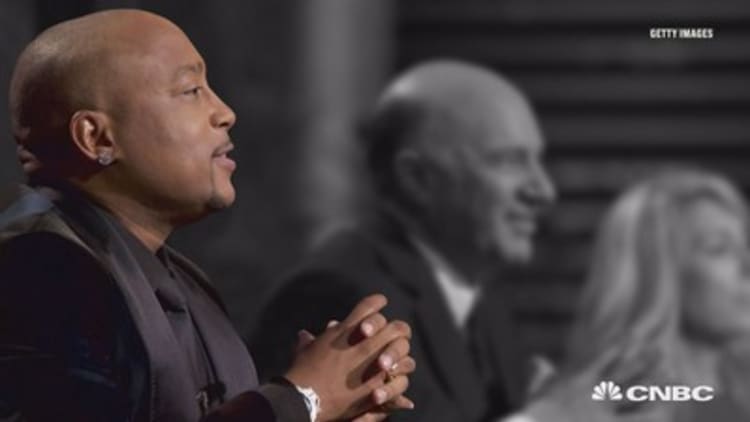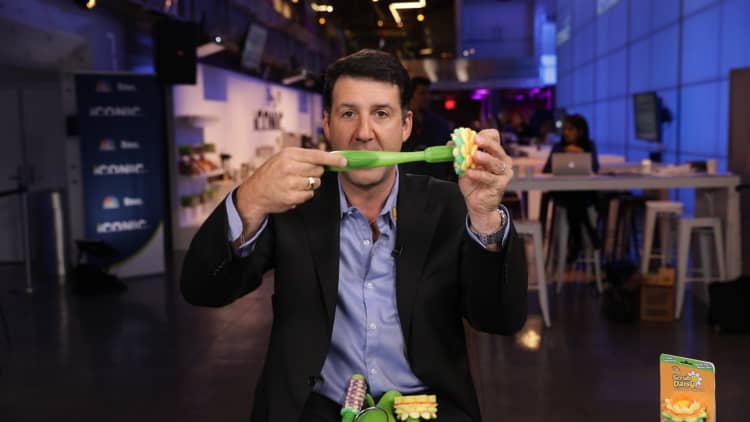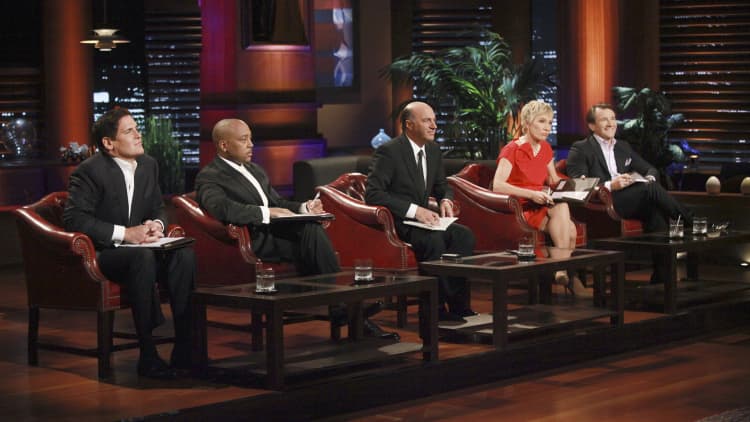The judges on ABC's "Shark Tank" can be hard to please. They've been known to criticize pitches, contestants and even each other.
And they aren't fans of crying in business. When entrepreneur Mikki Bey became emotional during her 2015 pitch on the show for her company Mikki Bey Eyelash Extensions, Barbara Corcoran advised her to remain in control.
"You've got to give up this crying stuff," Corcoran said.
Kevin O'Leary agrees, and he has held firm on that since the beginning of the show. In "Shark Tank's" first episode, O'Leary told Tod Wilson, owner of Mr. Tod's Pie Factory, "Don't cry about money, it never cries for you."
Judge Lori Greiner asked her audience to weigh in on the topic on Twitter, and 75 percent of those who replied said that they "hate it" when "entrepreneurs start crying."
But sometimes the sharks break their own rules.
The stories of a few inspiring entrepreneurs have been so heartfelt that even the judges have cried, in spite of their own preference for remaining professional.
Here are three pitches that had the sharks reaching for a Kleenex and how their businesses are doing today.
The Tree T-Pee
Johnny Georges' 2013 pitch for his company Tree T-PEE moved O'Leary.
"It was a particularly powerful moment in "Shark Tank," and no one's going to forget it," O'Leary told Business Insider. "Every shark had a tear in their eye, including me. He is a great soul, that man."
Georges came on "Shark Tank" seeking $150,000 for 20 percent of Tree T-PEE, which produces a product that shelters trees from frost and helps farmers save money on water for irrigation.
Georges had worked for his father in irrigation for 20 years, and over that time he installed over 30,000 acres of irrigation for citrus crops, according to the company's website.
What really struck O'Leary was Georges' passion to help his community, he told Business Insider.
"He didn't want to profit from it. He basically wanted to sell it at cost to help other farmers," O'Leary said. "Now, it's a powerful thing to want to do that, but it's not a business."
While O'Leary didn't want to invest, guest judge and billionaire John Paul DeJoria made a deal with Georges for Georges' initial terms.
"What you're doing is right, and you deserve the chance to make it big," DeJoria said.
Today, the company's relationship with DeJoria is still going strong, and sales are up.
"I call him every week," Georges tells CNBC Make It of his investor. "I've learned more in the last three years than in my whole life combined before that."
While the company now sells the product to 47 countries, it has kept the focus on farmers. That, Georges explains, has paid off.
"Every farmer that bought 50 or 100 came back and bought 1,000," he says. "Every one that bought 1,000 came back and bought 20,000."

Invis-A-Rack
Another judge, Robert Herjavec, became emotional after a 2012 pitch reminded him of his immigrant father's legacy.
Entrepreneur Donny McCall went on "Shark Tank" in pursuit of $100,000 for a 10 percent stake in his business, Invis-A-Rack, which makes a retractable rack for pickup trucks.
The sharks didn't invest because McCall was determined to manufacture the product in his American hometown despite their suggestions to seek cheaper solutions abroad.
Although McCall's emphasis on creating U.S. jobs made Herjavec wary of the business's ability to succeed, it also brought up powerful memories for him.
"My dad was a factory worker. When we came here, he worked in a factory and swept floors," Herjavec said. "My dad passed away last year, and I always asked him what was he most proud of. The first factory job — not when he made some money, not when he got promoted — that factory job where he swept floors, that made him proud."
Herjavec's family immigrated to Canada from Zbjeg, Croatia, with only "$20 and a suitcase," according to Entrepreneur.
"So I admire what you're doing," Harjavec continued, "but I just can't get involved with something where you are not taking care of the business."
After the episode aired, McCall got a pitch from another interested business partner.
Josh Knichel, a sales manager with Iowa-based auto accessory maker DeeZee, tells CNBC Make It that he saw the episode and thought the sharks missed out.
"I called him from my couch that day," he says.
McCall and Knichel struck a deal and the Invis-A-Rack has been manufactured and distributed by DeeZee — which makes the majority of its products in Des Moines, Iowa, according to its website — for nearly five years.
"We are very happy with where the sales and the volume are," Knichel says, though he declined to mention numbers.

Kronos
Phillip Lapuz walked into the Tank asking for $150,000 for a 15 percent stake in his high-end golf putter company Kronos. The conversation quickly turned from the business to his personal story.
He quit a stable job in consulting to start his company, but the move didn't inspire much confidence from the parents of his fiance.
"My fiance lives in Japan," Lapuz said in the 2014 episode. "She can't come out here unless I make this happen."
He explained to the sharks that he wants the business to be successful before they get married, and her parents are starting to lose faith in him.
"She's been sitting there waiting, it's been two years since I proposed to her," he said. "At that time, I was working in consulting and her parents approved, and now they don't approve. They think I'm crazy."
All of the sharks looked tearful, particularly O'Leary, although he still declined to invest.
"Your story really moved me, I've got to tell you," he said.
Lapuz's passion convinced Herjavec, who agreed to invest the money for a 30 percent stake.
"People that succeed in life tend to have a need for something greater than themselves," Herjavec said.
While she didn't pursue an investment, Barbara Corcoran had another offer to make for the aspiring entrepreneur.
"If your fiance doesn't marry you, I will marry you," Corcoran joked.
According to the company's Instagram, Lapuz found wedded bliss, though it is unclear if it is with the same woman.
As for the business, it's still going. Kronos co-founder Eric Williams told Signs.com in 2015 that average monthly online sales of the company's putters rose by 3000 percent after the episode.
Disclaimer: CNBC owns the exclusive off-network cable rights to "Shark Tank."
Don't miss: How Daymond John faced failure and ended up winning big
Like this story? Like CNBC Make It on Facebook.



